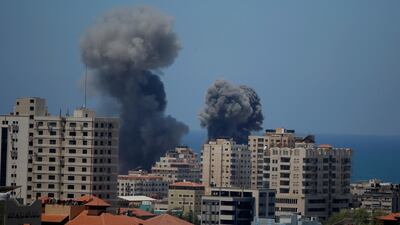At the heart of the dramatic escalation of violence between Israel and the Palestinians this month is a bold attempt by the Islamist militant group Hamas to demonstrate its leadership credentials for the Palestinian cause.
Although the original cause of the clashes between Palestinians and the Israeli security forces centred on a highly sensitive legal case concerning residents of the East Jerusalem neighbourhood of Sheikh Jarrah, the speed with which Hamas has been able to respond by firing hundreds of missiles at Israel has led to a major escalation in hostilities.
And, at a time when there is mounting frustration among Palestinians over the recent decision by Palestinian leader Mahmoud Abbas to postpone next month’s scheduled elections, Hamas’s ability to present a powerful military response to the Jewish state will undoubtedly boost its standing within much of the Palestinian community. The emergence of Hamas as the dominant force in Palestinian politics would certainly be welcome news for countries like Iran and Turkey, which are committed supporters of the Islamist cause espoused by the militant group.
And as the violence has intensified following last weekend’s ugly clashes at Jerusalem’s Al Aqsa Mosque, Hamas has certainly lost no time positioning itself as the primary defender of Jerusalem. Its military offensive, which has it fire an estimated 1,000 missiles at Israel this week, has been named “Operation Sword of Jerusalem”, while Hamas representatives are speaking loudly about their supposed role in defending the city.
As Talal Abu Zarifa, a local Hamas activist told The National earlier this week: "The resistance is defending our dignity, holy places and the rights of the Palestinian nation."
The prominent role Hamas is playing in the latest confrontation with Israel is certainly designed to increase its popularity among Palestinian voters in both the West Bank and Gaza. Historically, its main centre of support has been in the Gaza Strip, which it has controlled since Israel ended its occupation in 2005. Indeed, the organisation was able to use its base there to make a strong showing in the 2006 Palestinian elections, the last time Palestinians had the opportunity to cast a vote.
But while Hamas achieved an overall majority in the poll, Palestinian President Mahmoud Abbas, whose rival Fatah movement still controls the Israeli-occupied West Bank, was able to retain his leadership role. Mr Abbas blamed the political stalemate in Israel, where Prime Minister Benjamin Netanyahu is struggling to form a new government, on his decision to postpone this year’s parliamentary elections, citing concerns over the ability of Palestinians resident in Jerusalem to cast their votes.

But critics have argued the real reason for the postponement is that Mr Abbas and his Fatah colleagues feared Hamas would improve its showing in the poll, extending its grip beyond its traditional Gaza stronghold into the West Bank, thereby providing a significant challenge to Fatah’s long-standing dominance in the region. Fatah, which is riven with factional rivalries and domestic accusations of corruption, has come under increasing pressure since last year’s signing of the Abraham Accords, the Trump administration’s breakthrough initiative which resulted in a number of Arab governments, including the UAE and Bahrain, signing diplomatic agreements with Israel, with the prospect of many more following suit.
Mr Abbas, who refused to engage with Donald Trump after the former American president decided to move the American embassy to Jerusalem, found himself excluded from the process.
This has prompted Islamist opponents of the Accords, such as Hamas, who are totally opposed to any peace deal with Israel, to intensify their militant campaign.
Backed by Turkey and Iran, the Hamas leadership has been encouraged to adopt an increasingly uncompromising approach, with the result that the organisation now stands accused of deliberately escalating the latest Palestinian-Israeli conflict for its own ends. At the same time Israel’s security services must certainly share some of the blame for the worst outbreak of violence since 2014.
The heavy-handed approach of the Israeli police when confronted by Palestinian protesters at the Al Aqsa Mosque last weekend, in which they fired tear gas and rubber bullets inside one of the holiest sites in Islam, was provocative in the extreme, and has prompted fury throughout the Palestinian territories – and beyond.
Nevertheless, the fact that a dispute that initially arose over an attempt to use court proceedings to evict Palestinians from a Jerusalem suburb has now escalated to the point where the two sides are feared to be on the brink of all-out war owes much to the manner in which Hamas has been able to escalate hostilities.
Hamas’s new-found military strength, through which it is able to target Israeli cities like Tel Aviv, has certainly caught many observers by surprise, and owes much to the support it has received from Iran, which has provided help with designing and funding the rockets. Turkey is also understood to have provided financial backing for Hamas’s military effort.

Just how long the current conflict will last now depends to a large extent on how US President Joe Biden reacts to the first major Middle East crisis of his administration. The US leader has been criticised for prioritising negotiations with Iran on its controversial nuclear programme instead of supporting the Middle East peace process. This might explain why the Biden administration failed, as The National revealed this week, to heed warnings from at least two Arab governments that Washington needed to act to prevent tensions in Jerusalem from running out of control.
The appalling violence taking place between Palestinians and Israelis should serve as a powerful wake-up call to the American president that his administration’s first priority must be protecting the Middle East peace process instead of wasting valuable time and energy.
Con Coughlin is a defence and foreign affairs columnist for The National


